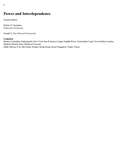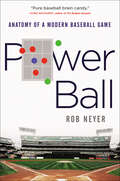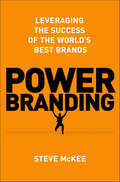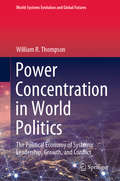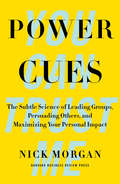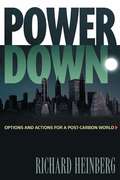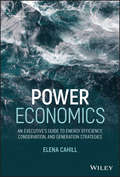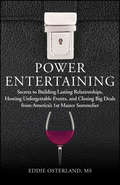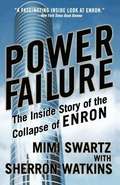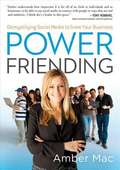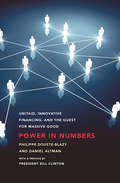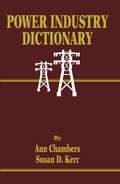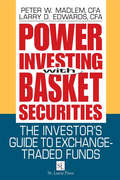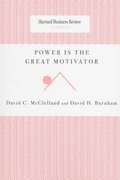- Table View
- List View
Power And Interdependence
by Robert Keohane Joseph NyeA landmark work of international relations theory, Power and Interdependence first published in 1977 and posited a radically comprehensive explanation of the mechanics driving world affairs–“power politics” on one hand and “complex interdependence” on the other hand. This widely influential book reexamined the military and economic interests of state and non-state actors, and in an argument made before the end of the Cold War, the authors broadened the prevailing realist worldview of the time and anticipated many of the developments in our modern era of globalization. With a new preface by the authors and a foreword by Fareed Zakaria that looks at world affairs after the Cold War, the terrorist attacks of September 11, and the global financial crisis, Power and Interdependence is required reading for all students of international relations.
Power Autonomy: Using the Biosphere's Rules to Renew Your Company With Renewable Energy
by Gregory C. UnruhExcessive global dependence on fossil fuels is a zero-sum competition that can cost your business dearly. While scientists may disagree about the impact of current levels of climate-changing greenhouse gases, they are essentially unanimous that the forecasted increases will be environmentally ruinous-and potentially ruinous for your company's productivity and reputation. Just as plants carry their energy technology within their structure, your company can integrate power autonomy into its fundamental processes-insulating your company from the risks of convulsing energy markets and impending regulatory restrictions on fossil fuel, but also creating more appealing products for customers, and saving you money. This chapter provides a customizeable approach to switching to renewable energy, including which aspects of your company you should focus on, why investing in altering existing power processes that were designed with cheap fossil fuels in mind won't be enough, and how power autonomy should fit together with your other efforts to align your business with the biosphere's rules. This chapter was originally published as Chapter 2 of "Earth, Inc.: Using Nature's Rules to Build Sustainable Profits."
Power Ball: Anatomy of a Modern Baseball Game
by Rob NeyerCasey Award Winner for Best Baseball Book of the Year: “Deep knowledge and punchy prose . . . a treat for dedicated fans.” —Publishers WeeklyOn September 8, 2017, the Oakland A’s faced off against the Houston Astros in a game that would signal the passing of the Moneyball mantle. Though it was only one regular-season game, the match-up demonstrated how Major League Baseball had changed since the early days of Athletics general manager Billy Beane and the publication of Michael Lewis’ classic book. In Power Ball, former ESPN columnist and analytics pioneer Rob Neyer dramatically recreates this action-packed game to reveal those myriad changes.Over the past twenty years, power and analytics have taken over the game, driving carefully calibrated teams like the Astros to victory. Seemingly every pitcher now throws mid-90s heat and studiously compares their mechanics against the ideal. Every batter in the lineup can crack homers and knows their launch angles. Teams are relying on unorthodox strategies, including using power-losing—purposely tanking a few seasons to get the best players in the draft.As he chronicles each inning and the unfolding drama as these two teams continually trade the lead right down to the bottom of the ninth, Neyer considers the players and managers, the front office machinations, the role of sabermetrics, and the current thinking about what it takes to build a great team, to answer the most pressing questions fans have about the sport today.“The scope of this book ranges . . . engagingly, from the potential impact of climate change on the game and the influence of social media on players, to the evolving fashions of player uniforms and hair styles . . . [The] prose is sharp and colorful and based on a deep understanding of the game.” — The Wall Street Journal“Pure baseball brain candy.” —Dirk Hayhurst, author of The Bullpen Gospels“Captures the humor and humanity in the game, as well as what makes the revelry and rivalry of baseball so special.” —Library Journal
Power Branding: Leveraging the Success of the World's Best Brands
by Steve McKeeEvery one of the largest, most successful corporations were, at some point, mere startups. McKee explains what enables some companies to growbigger and better, while others stumble along year after year, running but never winning the race. The difference is that the biggest and best brands aren't slaves to conventional marketing wisdom. McKee shows by example how the same, sometimes counter-intuitive, strategies used by the biggest brands can also best serve small and mid-sized companies. Among the topics explored: How can a company grow big by thinking small? Why do the best companies sometimes avoid being better? Why do brands that create the most memorable advertising stay away from focus groups? What is the secret to an effective slogan? When can admitting a negative become a positive? A diverse selection of companies provides powerful lessons, ranging from traditional icons like Coca-Cola, McDonald's, and General Motors, to new media models like Google and Facebook. This book appeals not only to time- starved executives, but also to middle managers and owners of small businesses who have a wide variety of marketing problems to address and who need to change the way they think about how to generate healthy, consistent growth.
Power Concentration in World Politics: The Political Economy of Systemic Leadership, Growth, and Conflict (World-Systems Evolution and Global Futures)
by William R. ThompsonThis book discusses the role of space, time and cyclical behavior in world politics. More specifically, the political-economic role of lead economies – the world’s most innovative economies for finite periods of time – in world politics. These represent unusual concentrations of new technologies, energy sources, and military capabilities of global reach that play disproportional roles in the conduct of international affairs and the provision of limited governance at the most macro level. They also possess close links to economic growth and intense conflict. The book describes the economic, military and political processes behind the systemic leadership of a state at the international level. It also highlights the economic preconditions of systemic leadership, such as economic monopoly of new technologies and energy, which underlie the system leader’s material advantage over others. Analyzing lead economies and the evolution of power over a number of centuries, the author demonstrates how disruptions wrought by the emergence of new technologies and energy sources are partly responsible for global conflicts. This book appeals to international relations scholars as well as anyone interested in the political economy of systemic leadership, growth, and conflict in world politics.
Power Cues
by Nick MorganTake control of your communications-before someone else doesWhat if someone told you that your behavior was controlled by a powerful, invisible force? Most of us would be skeptical of such a claim-but it's largely true. Our brains are constantly transmitting and receiving signals of which we are unaware. Studies show that these constant inputs drive the great majority of our decisions about what to do next-and we become conscious of the decisions only after we start acting on them. Many may find that disturbing. But the implications for leadership are profound.In this provocative yet practical book, renowned speaking coach and communication expert Nick Morgan highlights recent research that shows how humans are programmed to respond to the nonverbal cues of others-subtle gestures, sounds, and signals-that elicit emotion. He then provides a clear, useful framework of seven "power cues" that will be essential for any leader in business, the public sector, or almost any context. You'll learn crucial skills, from measuring nonverbal signs of confidence, to the art and practice of gestures and vocal tones, to figuring out what your gut is really telling you.This concise and engaging guide will help leaders and aspiring leaders of all stripes to connect powerfully, communicate more effectively, and command influence.
Power Cues
by Nick MorganTake control of your communications-before someone else doesWhat if someone told you that your behavior was controlled by a powerful, invisible force? Most of us would be skeptical of such a claim-but it's largely true. Our brains are constantly transmitting and receiving signals of which we are unaware. Studies show that these constant inputs drive the great majority of our decisions about what to do next-and we become conscious of the decisions only after we start acting on them. Many may find that disturbing. But the implications for leadership are profound.In this provocative yet practical book, renowned speaking coach and communication expert Nick Morgan highlights recent research that shows how humans are programmed to respond to the nonverbal cues of others-subtle gestures, sounds, and signals-that elicit emotion. He then provides a clear, useful framework of seven "power cues" that will be essential for any leader in business, the public sector, or almost any context. You'll learn crucial skills, from measuring nonverbal signs of confidence, to the art and practice of gestures and vocal tones, to figuring out what your gut is really telling you.This concise and engaging guide will help leaders and aspiring leaders of all stripes to connect powerfully, communicate more effectively, and command influence.
Power Down: Options and Actions for a Post-Carbon World
by Richard HeinbergIf the US continues with its current policies, the next decades will be marked by war, economic collapse, and environmental catastrophe. Resource depletion and population pressures are about to catch up with us, and no one is prepared. The political elites, especially in the US, are incapable of dealing with the situation and have in mind a punishing game of "Last One Standing." The alternative is "Powerdown," a strategy that will require tremendous effort and economic sacrifice in order to reduce per-capita resource usage in wealthy countries, develop alternative energy sources, distribute resources more equitably, and reduce the human population humanely but systematically over time. While civil society organizations push for a mild version of this, the vast majority of the world's people are in the dark, not understanding the challenges ahead, nor the options realistically available. Powerdown speaks frankly to these dilemmas. Avoiding cynicism and despair, it begins with an overview of the likely impacts of oil and natural gas depletion and then outlines four options for industrial societies during the next decades: Last One Standing: the path of competition for remaining resources; Powerdown: the path of cooperation, conservation and sharing; Waiting for a Magic Elixir: wishful thinking, false hopes, and denial; Building Lifeboats: the path of community solidarity and preservation. Finally, the book explores how three important groups within global society-the power elites, the opposition to the elites (the antiwar and antiglobalization movements, et al: the "Other Superpower"), and ordinary people-are likely to respond to these four options. Timely, accessible and eloquent, Powerdown is crucial reading for our times. Richard Heinberg is an award-winning author of five previous books, including The Party's Over: Oil, War and the Fate of Industrial Societies.
Power Dynamics in Organizations
by Linda A. HillDesigned to introduce the concepts of power and power dynamics to students in the MBA second-year elective course Power and Influence. Defines "power" and "influence," and explores the role of power dynamics in managerial work and in the life of organizations. Combats popular notions that "power is evil" and that "power corrupts" by illustrating how power is necessary to bring about productive and creative resolutions to organizational conflict. Describes the positional and personal sources of individual power, and concludes with implications for assessing power dynamics in organizations as an important element of one's career management.
Power Economics: An Executive's Guide to Energy Efficiency, Conservation, and Generation Strategies
by Elena CahillEnergy efficiency is more of a journey than a battle. It starts with small steps, taken at the local and state levels. It is a matter of identifying and then practicing good habits in our daily lives, at home and at work. Every idea and process described in this book, if performed reasonably well, will put money in your pocket. You will not only save money; you will probably make money—and you will take important steps toward saving the planet. Power Economics is a book for thoughtful people who want to cut their energy costs and diminish the harmful effects of greenhouse gas emissions. Climate change and global warming are not speculative fantasies. They are real. They threaten communities, towns, cities, regions, nations, and continents. Even if you don't care about polar bears and penguins, the effects of melting icecaps and shifting ocean currents will transform your life and the lives of the people around you. Power Economics offers practical steps and achievable strategies for reducing the destructive impact of climate change and global warming. Yes, we need energy to live and to sustain our economies. But we don’t need to burn fossil fuels and release CO2 gas at levels that will result in a global catastrophe. There are reasonable alternatives to our current practices. None of the ideas that described in this book are entirely new or totally unfamiliar. They aren't extreme or bizarre. They won't require harsh or draconian measures to work. All of them follow basic rules of common sense and can be achieved at reasonable cost. "I have done my best to convey the complexity and urgency of the matter. I hope that you find this book informative and useful. Working together, we can shed many of our wasteful energy habits and begin the task of building a world that is safe, sustainable and healthy," writes author and energy expert Elena Cahill.
Power Electronics and High Voltage in Smart Grid: Select Proceedings of SGESC 2021 (Lecture Notes in Electrical Engineering #817)
by Atma Ram Gupta Nirmal Kumar Roy Sanjoy Kumar ParidaThe book contains select proceedings of the International Conference on Smart Grid Energy Systems and Control (SGESC 2021). The proceedings is divided into 03 volumes, and this volume focuses on power electronics, machines, systems integrations, and high voltage engineering. This book is a unique collection of chapters from different areas with a common theme and will be immensely useful to academic researchers and practitioners in the industry.
Power Entertaining
by Eddie OsterlandMaster the art of entertaining and cement lasting business relationships in the process You're at a fancy downtown restaurant for dinner with a million-dollar business deal on the table. The waiter hands you the wine list. Now what? So much for that shiny M. B. A. and your powerful business connections. What matters right now, at this moment, is your wine IQ--and your ability to entertain this client in a way he'll never forget. In Power Entertaining Eddie Osterland, Master Sommelier, and America's foremost wine and food coach outlines dozens of power entertaining tips that can make anyone a more effective host or hostess--be it at a corporate business event or private dinners with clients in restaurants. When it comes to hosting big business meetings or important sales events, you will discover how to entertain business clients and business associates with ease, knowledge, and confidence, using good wine and food as the ingredients to build strong and lasting business relationships. Teaches how to transform boring business meetings and sales functions into memorable social events that people will want to attend again and again Enables you to build long-term business relationships based on the time-honored principles of courtesy, generosity and old world hospitality Learn how to convince the restaurant's Maitre d' to give them the best table in the house--even on a busy Friday or Saturday night Success is always in the details, so master the finer points of entertaining before your next big business event.
Power Etiquette: What You Don't Know Can Kill Your Career
by Dana May CaspersonNo-nonsense guidance to a crucial set of personal career skills. Can table manners make or break a megamerger? Can a faxing faux-pas derail a promising business relationship? Can an improper introduction cost you a client? Can manners (or lack of them) really kill a career? Absolutely. In an era when companies are competing on the basis of service, manners are much more than a social nicety -- they're a crucial business skill. In fact, good manners are good business. This no-nonsense "manners reference" refreshes readers on everyday etiquette and makes sure they're on their best behavior. It provides quick guidance on such pertinent and timely topics as: * telephone and e-mail etiquette * table manners *grooming and business dress * written communications * gift giving * resumes and interviews * making introductions * public speaking * networking, and more.
Power Failure in Management Circuits
by Rosabeth Moss KanterPower, the critical element in managerial behavior, is representative of efficacy and capacity, as well as dominance and oppression. An individual's power comes from his or her position in an organization and access to resources, information, and organizational support. Power positions allow job discretion, recognition, and task relevance. The more communication with superiors, peers, and subordinates, the more powerful the position is. Powerlessness is characteristic of task and routine oriented jobs. Managerial skills must be communicated to subordinates to ensure greater effectiveness in supervision. McKinsey Award Winner.
Power Failure: The Inside Story Of The Collapse Of Enron
by Mimi Swartz Sherron Watkins"They're still trying to hide the weenie," thought Sherron Watkins as she read a newspaper clipping about Enron two weeks before Christmas, 2001. . . It quoted [CFO] Jeff McMahon addressing the company's creditors and cautioning them against a rash judgment. "Don't assume that there is a smoking gun. " Sherron knew Enron well enough to know that the company was in extreme spin mode... Power Failure is the electrifying behind-the-scenes story of the collapse of Enron, the high-flying gas and energy company touted as the poster child of the New Economy that, in its hubris, had aspired to be "The World's Leading Company," and had briefly been the seventh largest corporation in America. Written by prizewinning journalist Mimi Swartz, and substantially based on the never-before-published revelations of former Enron vice-president Sherron Watkins, as well as hundreds of other interviews, Power Failure shows the human face beyond the greed, arrogance, and raw ambition that fueled the company's meteoric rise in the late 1990s. At the dawn of the new century, Ken Lay's and Jeff Skilling's faces graced the covers of business magazines, and Enron's money oiled the political machinery behind George W. Bush's election campaign. But as Wall Street analysts sang Enron's praises, and its stock spiraled dizzyingly into the stratosphere, the company's leaders were madly scrambling to manufacture illusory profits, hide its ballooning debt, and bully Wall Street into buying its fictional accounting and off-balance-sheet investment vehicles. The story of Enron's fall is a morality tale writ large, performed on a stage with an unforgettable array of props and side plots, from parking lots overflowing with Boxsters and BMWs to hot-house office affairs and executive tantrums. Among the cast of characters Mimi Swartz and Sherron Watkins observe with shrewd Texas eyes and an insider's perspective are: CEO Ken Lay, Enron's "outside face," who was more interested in playing diplomat and paving the road to a political career than in managing Enron's high-testosterone, anything-goes culture; Jeff Skilling, the mastermind behind Enron's mercenary trading culture, who transformed himself from a nerdy executive into the personification of millennial cool; Rebecca Mark, the savvy and seductive head of Enron's international division, who was Skilling's sole rival to take over the company; and Andy Fastow, whose childish pranks early in his career gave way to something far more destructive. Desperate to be a player in Enron's deal-making, trader-oriented culture, Fastow transformed Enron's finance department into a "profit center," creating a honeycomb of financial entities to bolster Enron's "profits," while diverting tens of millions of dollars into his own pockets An unprecedented chronicle of Enron's shocking collapse, Power Failure should take its place alongside the classics of previous decades - Barbarians at the Gate and Liar's Poker - as one of the cautionary tales of our times. From the Hardcover edition.
Power Failure: The Rise and Fall of an American Icon
by William D. CohanThe dramatic rise—and unimaginable fall—of America's most iconic corporation by New York Times bestselling author and pre-eminent financial journalist William D. CohanNo company embodied American ingenuity, innovation, and industrial power more spectacularly and more consistently than the General Electric Company. GE once developed and manufactured many of the inventions we take for granted today, nearly everything from the lightbulb to the jet engine. GE also built a cult of financial and leadership success envied across the globe and became the world&’s most valuable and most admired company. But even at the height of its prestige and influence, cracks were forming in its formidable foundation.In a masterful re-appraisal of a company that once claimed to &“bring good things to life,&” pre-eminent financial journalist William D. Cohan argues that the incredible story of GE&’s rise and fall is not only a paragon, but also a prism through which we can better understand American capitalism. Beginning with its founding, innovations, and exponential growth through acquisitions and mergers, Cohan plumbs the depths of GE's storied management culture, its pioneering doctrine of shareholder value, and its seemingly hidden blind spots, to reveal that GE wasn't immune from the hubris and avoidable mistakes suffered by many other corporations. In Power Failure, Cohan punctures the myth of GE, exploring in a rich narrative how a once-great company wound up broken and in tatters—a cautionary tale for the ages.
Power Friending
by Amber Mac"Amber understands how important it is for all of us, both as individuals and as businesses, to be able to use social media to connect with people in ways that are real and authentic. I think she's a leader in this space. " -Tony Robbins, world-renowned speaker and entrepreneur Amber Mac wants to be your friend. She may be a tech-savvy webpreneur, the popular host of TV shows and video podcasts, and an in-demand consultant and speaker, but if you ask Amber Mac about her strategy for success, she'll tell you she's just trying to be a good friend. When it comes to social media-whether it's Facebook or Twitter or the latest video blog-the tools evolve quickly, the rules change rapidly, and the technology feels more and more complex. But making social media work for your company doesn't have to be complicated or expensive. In this compact yet thorough guide, Mac shows you how to effectively harness the online world to grow your business. The secret: think of your audience as your friends and then treat them that way. The Power Friendingapproach is all about developing real relationships based on mutual respect and support. While you may never meet some of your online friends face-to-face, they still expect you to follow the established norms of friendship: be authentic, reach out, listen. And don't lie to your friends. These same rules apply when building a strong brand online. Whether you're a blogger, a small company, a well-known global enterprise, or an aspiring queen of the Internet, Mac shows how to make the most of social networking tools, including: -Targeting the right networks -Feeding and seeding a community -Authentically engaging with customers and fans -Managing your online friendships on a daily basis and on a budget This isn't a book of abstract theories or complicated strategies. Mac writes from personal experience: she built a huge fan base through social networking. She also draws on real-life and up-to-date examples to give you the information you really need in order to establish and maintain credibility and meaningful relationships online.
Power Genes
by Maggie CraddockA New Way of Looking at Power at WorkWho hasn't left the office after a particularly frustrating day wondering what they could have done to turn a negative experience into a positive one? Perhaps it was a difficult conversation with a domineering boss, or an encounter with a know-it-all peer who made you feel insecure. Would you believe the way you react to these interactions likely stems from the dynamics you experienced as a child? Could it be that your childhood persona has grown into your power persona at work?In Power Genes, executive coach Maggie Craddock reveals how to kick those old habits-trying too hard to please, acting out, using manipulative methods of persuasion-and tells how to use power more effectively to advance your career. Craddock identifies four power types and explains how to diagnose yours: The Pleaser-you make others feel good about themselves but need constant validation and approval from them The Charmer-you draw others in with your charm, yet trust is your Achilles heel The Commander-you take charge of the situation and gain admiration from others, but fear any loss of control The Inspirer-you are star power in action, yet your vision for the future can derail the needs of workers right nowThe book outlines a process for avoiding your type's signature destructive reflexes and replacing them with new behaviors-helping you to interact productively with other people in the office. By showing you how to recognize your type's blind spots and then recondition your actions, Power Genes will give you the insights and action plan you need to become a more consistently powerful professional. It's time to throw out unproductive habits and take charge of your workplace relationships.
Power Grab: Political Survival through Extractive Resource Nationalization (Business and Public Policy)
by Paasha MahdaviFor rulers whose territories are blessed with extractive resources -- such as petroleum, metals, and minerals that will power the clean energy transition -- converting natural wealth into fiscal wealth is key. Squandering the opportunity to secure these revenues will guarantee short tenures, while capitalizing on windfalls and managing the resulting wealth will fortify the foundations of enduring rule. This book argues that leaders nationalize extractive resources to extend the duration of their power. By taking control of the means of production and establishing state-owned enterprises, leaders capture revenues that might otherwise flow to private firms, and use this increased capital to secure political support. Using a combination of case studies and cross-national statistical analysis with novel techniques, Mahdavi sketches the contours of a crucial political gamble: nationalize and reap immediate gains while risking future prosperity, or maintain private operations, thereby passing on revenue windfalls but securing long-term fiscal streams.
Power Hungry: The Myths of "Green" Energy and the Real Fuels of the Future
by Robert BryceThe promise of green jobs and a clean energy future has roused the masses. But as Robert Bryce makes clear in this provocative book, that vision needs a major re-vision. We cannot--and will not--quit using carbon-based fuels at any time in the near future for a simple reason: they provide the horsepower that we crave. The hard reality is that oil, coal, and natural gas are here to stay. Fueling our society requires that we make good decisions and smart investments based on facts. In "Power Hungry," Bryce crushes a phalanx of energy myths, showing why renewables are not green, carbon capture and sequestration won't work, and even--surprise --that the U. S. is leading the world in energy efficiency. "Power Hungry" delivers a clear-eyed view of what's needed to transform the gargantuan global energy sector.
Power In Numbers: UNITAID, Innovative Financing, and the Quest for Massive Good
by Bill Clinton Philippe Douste-Blazy Daniel AltmanThe story of UNITAID begins with two world leaders but quickly becomes a lesson in popular philanthropy, involving millions of people each making a small contribution to a program aimed at treating and ultimately eliminating the threat of HIV/AIDS, tuberculosis and malaria in the developing world. In partnership with the Clinton HIV/AIDS Initiative (CHAI), UNICEF, and other organizations, UNITAID has pioneered techniques for raising massive amounts of money from a wide pool of donors. UNITAIDOCOs newest program, collecting small contributions via a check-box on the worldOCOs biggest travel websites, launches in the United States in January 2010. It is a fascinating model for philanthropy, proving that you can scale up both the fundraising and the ambition of lifesaving treatment programs. Moreover, UNITAID has proved able to continue its work uninterrupted by the financial turmoil that has blighted other private and government aid programs. It provides a model for challenging times. Launched as a crucial component of UNITAIDOCOs OC MassiveGoodOCO substantial national publicity and promotion campaign, "Power in Numbers" is an inspiring case study for anyone interested in social justice, public health, philanthropy, or fundraising.
Power Industry Dictionary
by Ann Chambers Susan KerrThis quick reference offers a broad spectrum of nearly 4,000 industry terms and phrases. Terms used in generation, transmission, and distribution can be found here, along with common business and billing language and terms related to the major governmental and industry regulations. Environmental terms and phrases relevant to the electric power industry are also included. As a convenience, additional reference material is located in the back of this volume, including an assortment of conversion tables, a table of the chemical elements and their associated symbols and weights, and a contact list of prominent industry organizations.
Power Investing With Basket Securities: The Investor's Guide to Exchange-Traded Funds
by Peter W. Madlem Larry D. EdwardsTremendously versatile, basket securities have the potential to change the way money is managed. This book provides the proper definition of the basket security, a brief exploration of their true history, and powerful ways to exploit their advantages. The authors explore simple yet effective ways basket securities can be used in asset management strategies including trading the market, building a diversified core, or creating a thousand stock portfolio. They cover the broad array of currently available basket securities and discuss others that are on the horizon, what and when to buy and sell, and how to protect investments from market declines.
Power Laws in Firm Size and Openness to Trade: Measurement and Implications
by Andrei A. Levchenko Julian Di Giovanni Romain RancièreA report from the International Monetary Fund.
